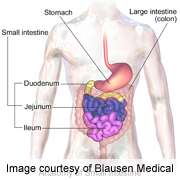Children with diabetes-associated autoantibodies have alterations in the gut microbiome, according to a study published in the April issue of Diabetes.
(HealthDay)—Children with diabetes-associated autoantibodies have alterations in the gut microbiome, according to a study published in the April issue of Diabetes.
Marcus C. de Goffau, from the University Medical Center Groningen in the Netherlands, and colleagues compared the intestinal microbiota composition of 18 children with at least two diabetes-linked autoantibodies with 18 autoantibody-negative children matched for age, sex, early feeding history, and human leukocyte antigen risk genotype.
The researchers found that β-cell autoimmunity correlated with a low abundance of lactate-producing and butyrate-producing species. Children with β-cell autoimmunity also exhibited a reduction in Bifidobacterium adolescentis and Bifidobacterium psuedocatenulatum, the two most dominant Bifidobacterium species; and an increase in Bacteroides genus. Children with β-cell autoimmunity did not exhibit increased fecal calprotectin or immunoglobulin A as a marker of inflammation.
"Functional studies related to the observed alterations in the gut microbiome are warranted because the low abundance of bifidobacteria and butyrate-producing species could adversely affect the intestinal epithelial barrier function and inflammation, whereas the apparent importance of the Bacteroides genus in development of type 1 diabetes is insufficiently understood," the authors write.
More information:
Abstract
Full Text (subscription or payment may be required)
Journal information: Diabetes
Health News Copyright © 2013 HealthDay. All rights reserved.



















